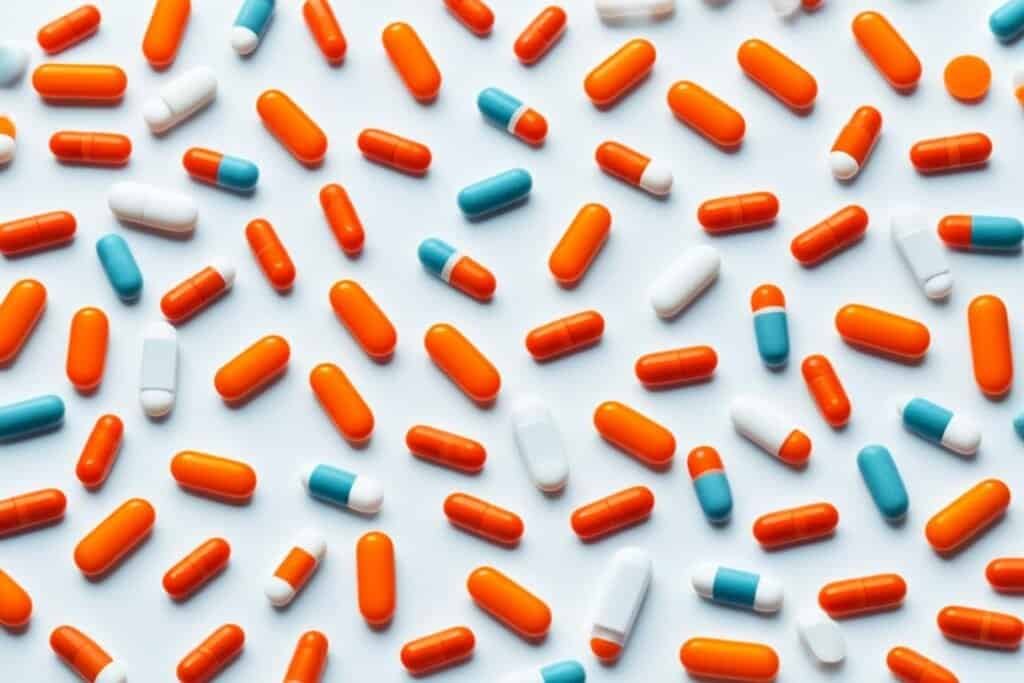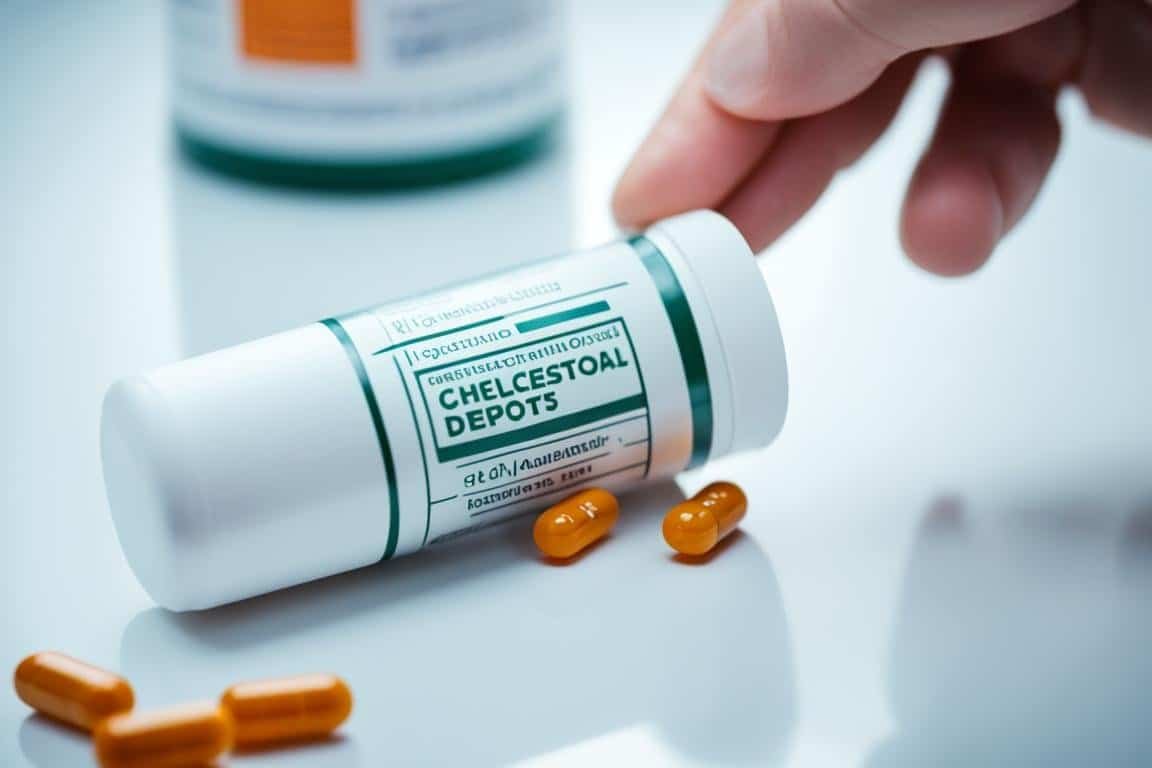If you’ve noticed small yellowish bumps on your skin, particularly around your eyelids, palms, or legs, you might be dealing with cholesterol deposits, also known as xanthomas. While these deposits themselves are harmless, they can be a sign of high cholesterol levels and underlying health conditions that require attention. The question that often arises is – can cholesterol deposits be treated with medication?
The good news is, yes, there are medications available that can help manage cholesterol deposits and lower cholesterol levels. The most commonly prescribed medication for high cholesterol and cholesterol deposits are statins. These medications work by reducing LDL (bad) cholesterol levels and can effectively lower the risk of cardiovascular diseases.
However, statins are not the only option. There are several other medications that can be used to treat high cholesterol and cholesterol deposits, including PCSK9 inhibitors, fibric acid derivatives, bile acid sequestrants, nicotinic acid, selective cholesterol absorption inhibitors, omega-3 fatty acids, and adenosine triphosphate-citric lyase (ACL) inhibitors. The choice of medication depends on individual risk factors and cholesterol goals, so it’s important to consult with a healthcare provider to determine the most appropriate treatment for you.
Remember, managing cholesterol deposits goes beyond medication. It’s essential to adopt a healthy lifestyle by following a balanced diet, engaging in regular physical activity, and maintaining a healthy weight. A combination of medication and lifestyle modifications can help effectively manage cholesterol levels and reduce the appearance of cholesterol deposits.
Key Takeaways:
- Cholesterol deposits, also known as xanthomas, can be a sign of high cholesterol levels and underlying health conditions.
- Medication, such as statins, can be used to manage cholesterol deposits and lower cholesterol levels.
- Other medications, including PCSK9 inhibitors, fibric acid derivatives, bile acid sequestrants, nicotinic acid, selective cholesterol absorption inhibitors, omega-3 fatty acids, and ACL inhibitors, can also be prescribed.
- Consult with a healthcare provider to determine the most appropriate medication and dosage for your individual needs.
- A healthy lifestyle, including a balanced diet and regular exercise, is an essential part of managing cholesterol deposits.
Understanding Cholesterol Deposits and their Causes
Cholesterol deposits, also known as xanthomas, are skin growths that develop due to a buildup of cholesterol. These deposits can appear on various parts of the body, including the palms, legs, and eyelids. While cholesterol deposits are usually painless, they can become large or uncomfortable, prompting individuals to consider removal options.
Cholesterol deposits are often indicative of high cholesterol levels and may be associated with underlying health conditions such as familial hypercholesterolemia, combined dyslipidemia, obesity, diabetes, or certain genetic disorders. Therefore, it is crucial to consult with a healthcare provider to identify the underlying cause of cholesterol deposits and receive appropriate treatment.
Treatments for Cholesterol Deposits
- Medication: Healthcare providers may prescribe cholesterol-lowering medications as part of the treatment plan. These medications can help manage cholesterol levels and reduce the size of cholesterol deposits.
- Lifestyle modifications: Making lifestyle changes, such as adopting a healthy diet, engaging in regular physical activity, and maintaining a healthy weight, can significantly improve cholesterol levels and overall cardiovascular health.
- Medical procedures: In some cases, healthcare providers may recommend procedures to remove cholesterol deposits, such as laser therapy, cryotherapy, or surgical excision.
It is important to note that treatment options may vary depending on individual circumstances and the severity of cholesterol deposits. Therefore, working closely with a healthcare provider is essential to determine the most suitable course of action.
Medication Options for Treating Cholesterol Deposits
If you have cholesterol deposits, medication can be an effective treatment option. One commonly prescribed medication for high cholesterol and cholesterol deposits is statins. Statins work by lowering LDL (bad) cholesterol levels, which can help prevent cardiovascular disease. However, there are also other medications available that can be used to treat high cholesterol and cholesterol deposits.
Here are some medication options that your healthcare provider may consider:
- PCSK9 inhibitors: These medications help lower LDL cholesterol levels by blocking a protein that prevents the liver from removing LDL cholesterol from the blood.
- Fibric acid derivatives: These medications can lower triglyceride levels and increase HDL (good) cholesterol levels.
- Bile acid sequestrants: These medications work by binding to bile acids in the intestine and preventing their reabsorption. This can help reduce cholesterol levels.
- Nicotinic acid: Also known as niacin, this medication can help lower LDL cholesterol and triglyceride levels while increasing HDL cholesterol levels.
- Selective cholesterol absorption inhibitors: These medications block the absorption of cholesterol in the small intestine, reducing its levels in the blood.
- Omega-3 fatty acids: These supplements can help lower triglyceride levels.
- Adenosine triphosphate-citric lyase (ACL) inhibitors: These medications work by inhibiting an enzyme involved in cholesterol synthesis.
The choice of medication will depend on your individual risk factors and cholesterol goals. It is important to consult with your healthcare provider to determine the most appropriate medication and dosage for your specific needs.
Remember, medication is just one part of the treatment plan for cholesterol deposits. Lifestyle modifications such as a healthy diet, regular exercise, and weight management are also important for managing cholesterol levels. Working closely with your healthcare provider will help ensure you receive personalized treatment recommendations and monitoring.

Benefits and Considerations of Cholesterol Medication
Cholesterol medication, such as statins, can provide several benefits for individuals with high cholesterol and cholesterol deposits. These medications effectively lower LDL (bad) cholesterol levels, reducing the risk of cardiovascular diseases and improving the function of blood vessels. Statins also have additional benefits that contribute to overall heart health:
- Reduces inflammation: Statins can help reduce inflammation in the body, which is a risk factor for heart disease.
- Prevents blood clot formation: By improving blood flow and reducing the stickiness of platelets, statins can help prevent the formation of blood clots.
- Stabilizes arterial plaques: Arterial plaques are fatty deposits that can accumulate in the arteries and lead to blockages. Statins can help stabilize the plaques, reducing the risk of rupture and subsequent cardiovascular events.
While cholesterol medication can be highly effective, it’s important to note that it may not be sufficient to manage cholesterol deposits on its own. Lifestyle modifications such as adopting a healthy diet, engaging in regular exercise, and maintaining a healthy weight are also crucial for managing cholesterol levels and overall cardiovascular health.
It’s essential to have an open discussion with your healthcare provider about the benefits and considerations of cholesterol medication. They can help determine the most appropriate treatment plan based on your individual risk factors, cholesterol goals, and overall health profile.

Conclusion
Cholesterol deposits can be effectively treated with medication, providing relief from the symptoms and reducing the risk of cardiovascular diseases. Prescription drugs like statins and other cholesterol-lowering medications work by lowering LDL (bad) cholesterol levels in the body, addressing the root cause of cholesterol deposits. However, it is crucial to consult with a healthcare provider to determine the most suitable medication and dosage based on your individual risk factors and cholesterol goals.
Aside from medication, lifestyle modifications play a fundamental role in managing cholesterol deposits and maintaining overall cardiovascular health. Adopting a healthy diet that includes low cholesterol and low saturated fat foods, along with regular exercise, can have a significant impact. These lifestyle changes help to control cholesterol levels, prevent further cholesterol deposits, and improve overall heart health.
It is recommended to work closely with a healthcare provider throughout your treatment journey. They can guide you in making informed decisions about medication, monitor your cholesterol levels, and provide ongoing support and guidance. By combining medication, lifestyle modifications, and healthcare guidance, you can effectively manage cholesterol deposits and take control of your cardiovascular health.

